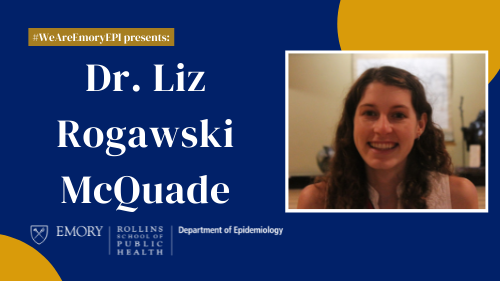#WeAreEmoryEPI: Meet Dr. Liz Rogawski McQuade
Category : #WeAreEmoryEPI
Meet Dr. Liz Rogawski McQuade! Dr. Rogawski McQuade is an Assistant Professor in our Department of Epidemiology with research interests in pediatric enteric disease in low-resource settings. In this feature, she talks about her research, advice for MPH students, and some fun facts about her. Read more below.
Tell us a little bit about your academic history/where you went to school.
I went to Emory for my undergraduate degree with majors in Biology and Chemistry. I received an MSPH and PhD in Epidemiology from the University of North Carolina – Chapel Hill and completed a post-doctoral fellowship in infectious disease epidemiology at the University of Virginia.
What are your primary research interests?
My research interests are in pediatric enteric disease in low-resource settings. Specifically, I focus on the complex interactions between early childhood diarrhea, enteric infections, environmental enteropathy, antibiotic use, and their effects on child health and development. I am also interested in better understanding the impact of vaccines and other interventions for enteric diseases and apply causal inference-based methods to generate epidemiologic evidence that is relevant to public health interventions.
How did you find the research that you are currently conducting?
My current work has grown out of strong collaborations with colleagues at international institutions including the Haydom Global Health Research Centre in Haydom, Tanzania and icddr,b in Dhaka, Bangladesh, as well as through collaborations with research consortia conducting large multisite studies of enteric disease. My current research builds on previous work to characterize the foundational epidemiology of enteric infections to focus on environmental and vaccine interventions in low-resource settings.
Are there any exciting manuscripts or projects that you are currently working on?
I am very excited to launch two upcoming field studies that I am a co-investigator on: Enterics for Global Health (EFGH) which aims to estimate the incidence and consequences of shigellosis among children in low-resource settings in preparation for Shigella vaccine trials, and the Shigella and Campylobacter Transmission (SCAT) study which aims to understand the sources and routes of transmission of these two pathogens in Haydom and Dhaka using molecular diagnostics and a systems-dynamic modeling approach.
What is your favorite part about being at Emory?
I love being surrounded by incredibly bright and diverse epidemiologists (including students!) who challenge me to do better research, use more innovative methods, and make a larger impact.
What advice do you have for MPH students?
Public health is an incredibly diverse field, but many of the methods and tools used in epidemiology are broadly applicable across topic areas. I suggest that students focus on honing their methodological skills, which will serve them well in whatever specific field they choose or direction their career goes.
How have you been spending your free time?
Playing with my 15 month old son, Simon!
If you currently live in the Atlanta area, what is one place that you would recommend people to visit?
We just moved to Decatur, but are loving Hawk Hollow, a tiny gem of a park near our house.
What are some fun facts that you want your students to know about you?
I am a huge tea drinker and my husband owns a small tea company, so I have a steady supply. I love hiking and being outdoors, reading, and yoga.
Thank you for talking with us, Dr. Rogawski McQuade! We hope everyone has a fun and safe break this week. Tune in next Monday for another feature of #WeAreEmoryEPI.
